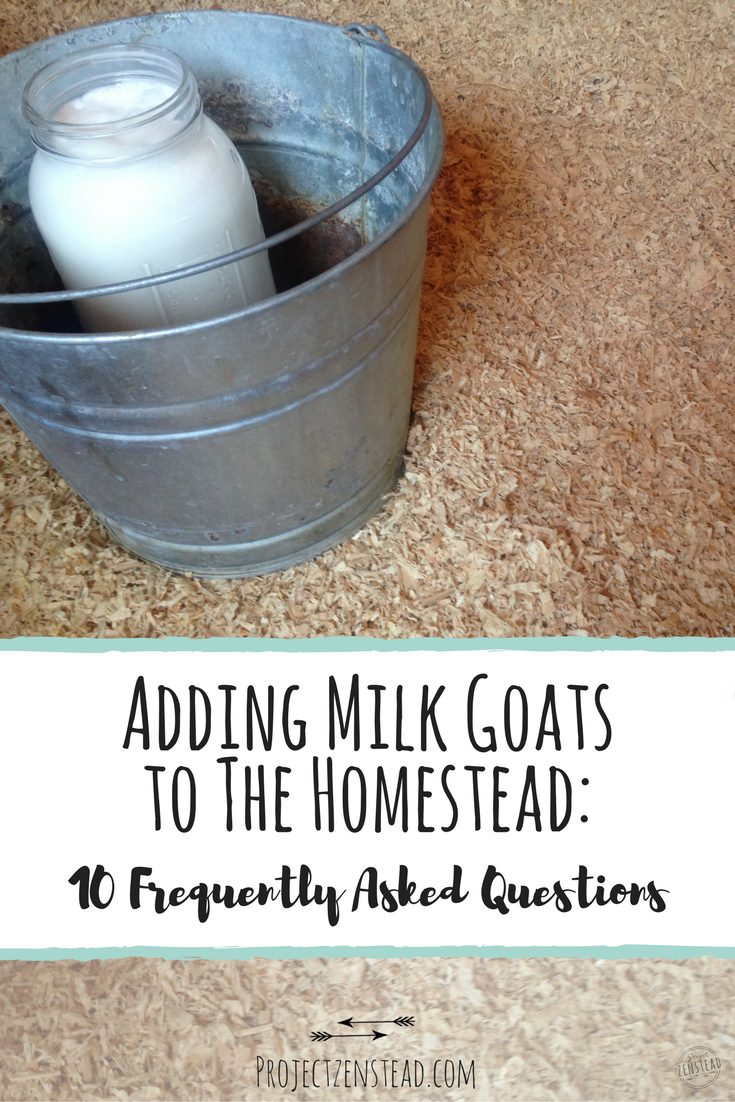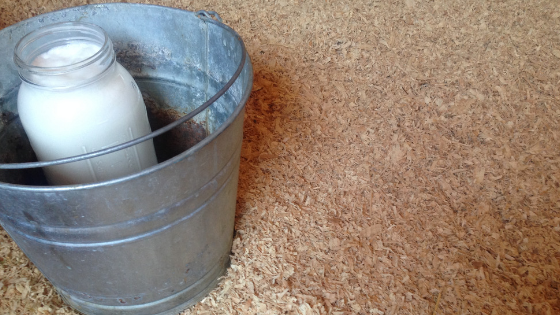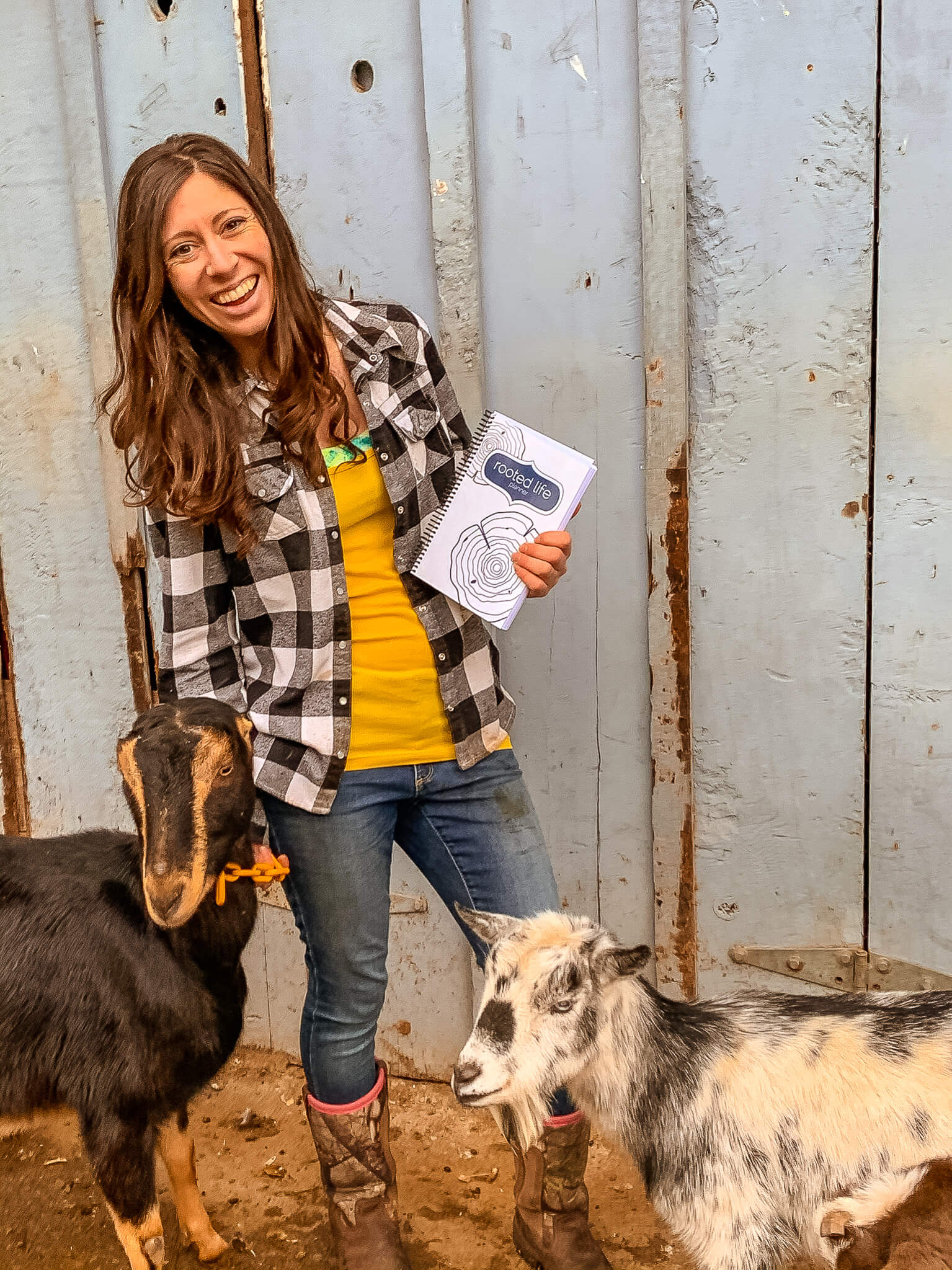Are you considering milk goats for your homestead? Today, I’m sharing my experience and answering the top 10 questions that people ask me about owning goats!
Milk goats can be fantastic animals for a homestead! In addition to providing milk and dairy products, goats can be very enjoyable animals and companions. Their small size can make them easier to manage, feed and house than other dairy animals. And it’s no secret that I love me some goats! But that doesn’t mean that they are perfect for every homestead. There are a lot of considerations that should be taken before adding goats to your homestead.
When people find out that we have milk goats, they generally have lots of questions! I’m not a goat expert by any means, but I do my best to continually educate myself and provide the best quality life possible for my goats. I also want to help other people learn about goats and make wise decisions for their homesteads, which is why I am happy to share my experiences.
So today, I am sharing the top ten questions that people ask me about owning milk goats!
1. Does the milk taste “goaty”?
If you’ve ever bought canned goat milk from a supermarket, you will understand what it means for milk to taste and smell “goaty”. To me, the taste of canned goat milk from the store is pretty much the equivalent of how I would imagine licking a smelly buck would taste. No thanks! I won’t touch the stuff! Fresh goat milk, on the other hand, is absolutely delicious in my opinion! When it is handled and cooled correctly, it has a very subtle, sweet taste. I actually think that cow’s milk from the store has a stronger flavor than our fresh goat milk.
There are some factors involved in having delicious tasting milk though. The milk needs to be handled properly and cooled quickly. I personally think it tastes best when used within 5(ish) days of milking. Anything older than that I will generally use for cheese or yogurt. Diet, stress and hormones also play a role in the flavor of goat milk. If you are hesitant about the flavor and if it is legal to do so in your area, I would recommend that you seek out a couple of different family goat dairies and buy some milk to try.
2. Do I need to pasteurize the milk?
This is a personal decision. Some people choose to pasteurize their milk before using it for human consumption. Before we got goats, I did a lot of research into the benefits and risks associated with raw milk. Ultimately, I decided that I feel safer drinking raw milk from my own goats than I do drinking pasteurized milk from the store. Why? Because I know everything about my goats and their care and the way the milk was handled.
Our goats are tested at least once a year for TB, brucellosis, CAE, CL and Johnes. We also test the milk periodically throughout the season to ensure bacteria levels (somatic cell count) are below acceptable levels. Unlike many big corporate-owned dairies, our animals’ care is our number one priority. From the feed we choose to the daily care routine, everything we do is because we care about the quality of our animals. Healthy animals will produce healthy milk! Plus there are so many beneficial nutrients and vitamins in raw milk that are lost during the pasteurization process. Again, this is a personal choice and I highly recommend that you do proper research and arrive at your own conclusion.
3. How much land do I need?
One advantage of having milk goats rather than a milk cow is that they are much easier on the land and do not require as much space or feed as a cow. They also don’t need as big of shelter as a cow. I would love to have a beautiful Guernsey cow someday, but because we homestead on 0.8 acres, goats were the obvious choice! Our pasture area is probably about half an acre which provides ample room for our goats to run and play. However, since the pasture is small, we supplement their feed with hay year-round.
I don’t have an exact number for how many goats you can have per acre, because it greatly varies based on what kind of land you have and if you will be supplementing feed. The most important thing to consider is that a smaller space will require more upkeep. No matter how big your space is, I highly recommend having a rotation system if possible, as this will help reduce parasites and maintain a healthy herd.
4. What kind of goat is best?
Oh man, this question is similar to asking about politics! Everyone has an opinion and everyone is very passionate! Frankly, I’ve never met a goat I didn’t like! I seriously love them all! But different goats may be better for different reasons. Obviously, dairy breeds are going to be your top picks for milkers.
Nigerian Dwarfs are a nice compact breed that produce seriously delicious milk. Their milk is the sweetest and the highest in butterfat, but they also don’t produce as much as a full-sized milk goat. Full-sized dairy goats produce more milk than a Nigerian, but also require a bit more feed. You may also want to consider a “mini” which is a cross between a Nigerian Dwarf and a full-sized dairy breed. This can be a good compromise as they produce more than a Nigerian, but are still smaller than a full-size dairy goat and often maintain a little higher butterfat level that a full-sized goat. We currently are focusing on Nigerian Dwarfs, LaManchas and mini-LaManchas.
5. How often do goats have to be milked?
Goats should be milked at least once a day. However, milking twice a day (every 12 hours) can help to better maintain consistent production. Milking generally doesn’t take long, depending on how many goats you are milking. It takes us about half an hour to feed and milk 2-3 goats. We enjoy hand milking because it allows us one-on-one time to spoil each of our milkers, but a milking machine (like the Simple Pulse Milker) can be a good option too, especially if you experience pain or arthritis in your hands.
6. How much milk will I get?
This question is very hard to answer. There are a bunch of factors involved in milk production, including the breed of goat, quality of genetics, quality of feed and care, age of the goat, how many times the goat has freshened (given birth) and how long it has been since freshening. Your best bet for productive milk goats is to buy high quality goats that have good milking genetics.
In my experience, our Nigerian Dwarfs give us an average of anywhere from about two cups to half a gallon per day. Although, somedays they hit it out of the park and milk way more! And sometimes our mini-LaManchas produce almost as much milk as their full-sized counterparts! Full-sized breeds, on average, can milk around 1-2 gallons per day.
Again, it’s incredibly hard to say what the “normal” amount is because it is so highly dependent on genetics, feed and other factors. If you want a highly productive milk goat, focus on developing a quality herd and providing the best nutrition possible.
7. What about the babies?
It’s no secret that you have to breed a goat before it produces milk. When it comes to the best way to raise kids (baby goats) this is another question where you will get some passionate answers. Many people “hand raise” kids which means that you remove them from the doe after birth and bottle feed them. Other people leave the kids with mom and let her raise them. Some people feel that hand-raising kids allows them to be more social while others believe it makes them a bit too social and overly “clingy” to their people.
Both methods work well and it really just needs to be a personal decision based on what works best for you. Also, it should be noted that some does produce plenty of milk for their babies and even extra that you can use. But other goats may not produce enough, especially if they have multiple kids. In either situation, it is generally practiced that the kids get first dibs on milk until they are weaned or sold. I would highly recommend that you talk to many goat breeders with a variety of different methods. Then you can have plenty of ideas and find the best method for your life and your herd.
8. How many goats do i need?
All the goats!
Not really, though! Goats are herd animals and are very social so I would never recommend getting a single goat. You may also want to consider how many goats you want in milk. I prefer to have a couple that kid in late winter and couple that kid in early fall. That way, it’s not as overwhelming for me as it is to have everyone kid at once and it allows us to have goats in milk almost year round. The amount of goats you can have will also vary based on how big your pasture and shelters are. Just be careful because goats are like potato chips: you can’t have just one and they can be addicting!
9. What do goats eat?
Contrary to popular belief, goats actually have a pretty interesting and sometimes sensitive digestive system. They are ruminant animals, which means that their stomach has four chamber which are used to digest and ferment their food. Goats are natural browsers, not grazers, which makes them a bit easier on pastureland than other animals. Brush, trees and even certain weeds are favorite snacks for goats!
Like any other animal, goats require high quality feed. If you plan to keep your goats in a smaller lot or in a dry pasture, you will need to supplement with hay (generally grass or alfalfa). Goats should also have access to free-choice minerals at all times. These minerals are like a goat version of a multi-vitamin and supply them with necessary nutrients. High quality grain is also often used to supplement goats that are in milk. Proper goat nutrition is a fine art – one that I am still learning after years of owning goats! If you decide to keep goats, continually learning and improving your knowledge on nutrition will benefit both you and your herd!
10. Is it worth all the work?
For me, the answer is a resounding “YES!”. It’s a lot of work and it is a commitment to care for them and to continue educating myself to be the best steward possible. There can be heartbreaking moments and it’s not always fun. But we don’t have goats strictly because we want milk. We have goats because we love having goats. The delicious milk, cheese, yogurt and other products are all just icing on the cake! I also love knowing where my food comes from and being directly involved in the whole process. For me, it feels like the responsible thing to do. I am excited to be able to share our healthy products with others so that they can also enjoy their food knowing that the animals live happy, healthy lives!
If you like it then you better put a PIN on it!









Marva Mowad
Saturday 28th of March 2020
Congratulations this is an amazing guide!, I'm called by my husband "The Goat Lady", I'm a City girl that got tired of all the hussle and bussle and we seeked for calm, fresh, open land!, we have abot 7 acres and we love goats!, we're up to 20 and yes they are addicting! Love all your ideas, thank you so much for sharing them.
Project Zenstead
Saturday 28th of March 2020
That's awesome! I'd wear that nickname like a badge of honor! ? But yes, they are addicting! I think the most we ever got to was 18 ? but now we are down to just 2 since we moved last month. But we are in the market for more! ? Seriously, they are like potato chips - you just can't stop!